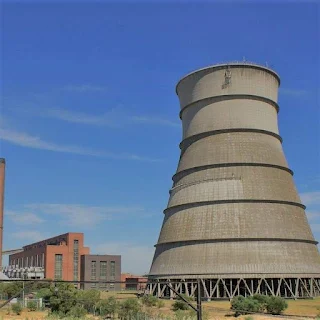South Africa’s Coal-Fired Electricity and Digital Transition in 2025
Medupi Power Station
Medupi Power Station is a large coal-fired power plant located in Limpopo province, South Africa. With a total capacity of 4,584 MW, it is one of the largest dry-cooled coal-fired power plants in the world.
South Africa’s electricity generation remains heavily reliant on coal, which accounts for over 80% of the country’s electricity supply in 2025. The country is also one of the world’s largest coal producers, and the coal industry continues to play a major role in the national economy.

The Role of Coal Power Today
South Africa's coal-fired power plants remain the backbone of the country’s electricity supply and economy. However, their environmental impact and contribution to climate change are under intense debate as the nation works toward a cleaner energy future.
Coal Mining
Coal production is dominated by major companies such as Anglo American, Sasol, and Exxaro Resources. Most coal is mined from large open-pit operations located in Mpumalanga province.
Aging Infrastructure
Many of South Africa’s coal-fired plants are decades old, with some dating back to the 1960s and 1970s. This raises concerns about efficiency, safety, air pollution, and greenhouse gas emissions. The state-owned utility Eskom operates most of these plants and generates the majority of the country’s electricity.
Major Eskom Coal-Fired Power Stations
- Medupi Power Station
- Kusile Power Station
- Kendal Power Station
- Lethabo Power Station
- Majuba Power Station
- Matla Power Station
- Tutuka Power Station
- Grootvlei Power Station
- Duvha Power Station
- Camden Power Station
Eskom’s coal-fired fleet has a combined installed capacity of approximately 37,000–39,000 MW and continues to generate over 80% of South Africa’s electricity in 2025.
Environmental & Health Impacts
Burning coal releases harmful pollutants such as sulfur dioxide, nitrogen oxides, and particulate matter, which contribute to respiratory problems, heart disease, and other health issues.
Coal is one of the most carbon-intensive fossil fuels. Its combustion releases large amounts of carbon dioxide, significantly contributing to global climate change, rising sea levels, extreme weather events, and ecosystem damage.
Even as emission-reduction technologies (such as flue-gas desulfurisation) are gradually introduced at stations like Medupi and Kusile, coal-fired plants remain a major source of air pollution and greenhouse gas emissions.
Bridging Coal to the Digital Era
While coal powers South Africa’s electricity grid, it also underpins the nation’s growing digital economy. Reliable energy from plants like Medupi supports data centers, telecommunications, and digital platforms that drive innovation, from fintech startups in Johannesburg to e-commerce across the continent. However, the digital divide in South Africa—and across Africa—remains a challenge. Over 80% of South Africans own mobile phones, yet only about 45% have internet-enabled devices, with rural areas, women, and low-income groups facing the greatest barriers. High data costs (up to 12% of monthly income in some regions) and smartphone prices (often exceeding 120% of earnings for the poorest) limit access to digital opportunities.
The coal industry itself is digitizing, with companies like Exxaro adopting AI for mine optimization and Eskom exploring smart grids to improve reliability. These advancements could stabilize power for digital infrastructure but must be balanced with environmental accountability. Initiatives like Kenya’s public Wi-Fi hotspots offer a model for South Africa to expand connectivity, ensuring that the energy from coal plants powers not just homes but also equitable access to the digital world.
The Transition to Renewables
To reduce reliance on coal, South Africa has committed to adding at least 17.8 GW of renewable energy capacity by 2030, with updated plans targeting up to 29.5 GW of new wind, solar, and storage projects. In 2025, renewable sources already contribute around 18% of electricity generation—a share that continues to grow steadily. This transition supports both environmental goals and the digital economy by powering sustainable tech hubs and reducing outages that disrupt connectivity.













